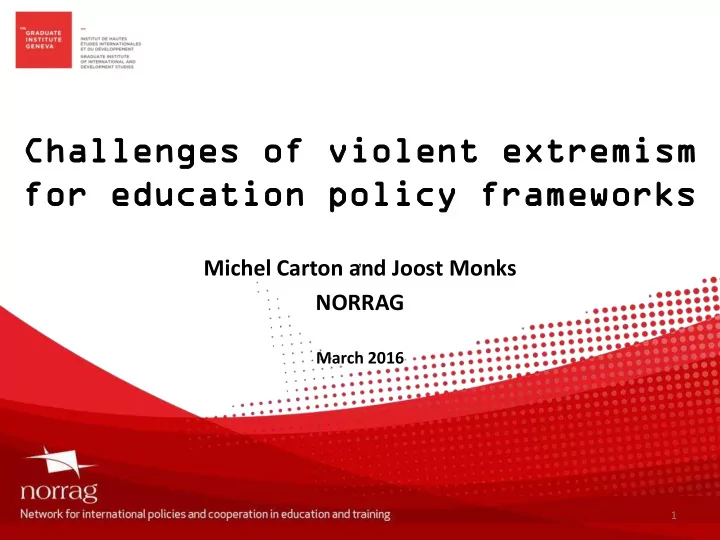

Ch Chal allenges lenges of of vi viol olent ent ex extr tremis emism m fo for r ed educ ucat ation ion po poli licy cy fr fram amew eworks orks Michel Carton and Joost Monks ʼ NORRAG March 2016 1
In Intr trod oducti uction on What are we talking about? Violence And… Education 2
Ar Aris isin ing g qu ques esti tions ons Is education important? What kind of education helps? We need to contextualise first … 3
Ha Hard rd ex extr trem emis ism m or or so soft ft ex extr trem emism: ism: vi viol olen ent t an anyw yway ay! «Explaining (Djihadism) = starting excusing it» «No social, sociological, cultural excuse must be sought » Manuel Valls, French Prime Minister, November 2015 & January 2016 Are scientists, academics dangerous and/or useless? Anticipating/Preventing violent extremism without knowing why it does exist? 4
Ed Educ ucat ation ion fo for: r: anticipati ticipating, ng, preve eventin nting, g, countering, ntering, fighting ghting (yout outh) ) viole olence, ce, 'viole olence ce pron one' youth, th, terrorism rrorism, , extremism tremism, , radicalisa dicalisation? tion? «If you want to fight terrorists, educate girls» Stravos Lambridinis, EU Special Representative for Human Rights, February 2016 «L ’ école française? Un lieu de la ʻ mécréance ʼ et de la ʻ perversion ʼ. Les professeurs? Des ʻ corrupteurs ʼ à ʻ combattre et tuer ʼ» French language website, quoted in Le Monde on 5th December 2015 «Education is a double-edged sword» Tony Blair Faith Foundation, 2014 5
Wh What at ar are ed e educ ucat atio ion n an and tr d trai aini ning ng for: for: Individual and/or collective life + work? Reproducing and/or understanding + changing world + life long learning + empowering? Individual autonomy and/or dependency? Global inclusion and/or integration? Human and social development (human rights) and/or economic development (progress, modernity, ʻ sustainable ʼ growth…)? Countering inequalities, exclusion and/or selecting the elite? Balancing, in a contextualised way, knowledge(s), values, beliefs, skills, desires…? 6
How ow can n educ ucation tion and d trai aining ing sys ystem tems s ref eflec lect t thes ese e vari riou ous s combinations? Combinations vision of education as an open ended process, since 18th century in Europe when people are seen as potentially educable/transformable in relation with a societal project What are the societal projects in SDC bilateral and humanitarian aid such as for instance Near and Middle East countries, Burkina Faso or Indonesia: (inclusive, sustainable, pro-poor) growth, reconstruction, youth employment, decent work, reducing inequalities, sharia led societies, peace…? Education processes, structures and actors not everywhere the same at the same time, potentially reversible (Education systems after World War II in Germany, Japan; Curriculum in India, Hungary in 2000s..) 7
Can n internati ernation onal al E+T policies licies cope e with th contextual textualised ised objec jectives, ives, globalised obalised evolu olutions tions and violent lent extr tremism emism – North rth and South? uth? No or weak ʻ traditional ʼ growth: no, or little employment creation growing youth (bulge) unemployment => NEETs growing social and economic inequalities and exclusion New industrial revolution (robotisation, virtualisation) changing nature, organisation and value of Work (HDR 2015, WEF 2016) 8
Ca Can n in inte tern rnat ational ional E+ E+T pol T polic icie ies s cope …(continued) Are the informal sectors to provide low skills for national industries or for global internet firms? Educating and training for whom and what: New humanistic education, including ʻ ethics of religions ʼ ? Rethinking Education: Towards a Global Common Good? (Unesco 2015) Can schooling, being a universal ʻ model ʼ according Education SDG4- Target 4.1, cover all the potential mix of contextualised issues and perspectives? 9
Ca Can n in inte tern rnat ational ional E+ E+T po T poli lici cies es cope …(continued) Can TVET, as defined and embedded in SDG4, take into account the NEETs and quasi NEETs who reflect the lack of continuity solutions between education (= schooling) and different forms of training, as well as between this continuum and socio-economic integration (= youth policies + integrated development of the 60 ’ s) ? Are UNESCO and ILO in a position to ʻ govern ʼ these issues, in general and in the wake of ʻ securitisation ʼ of E+T policies? What is the role of public and non state national/regional actors for balancing global ʻ securitisation ʼ and contextualisation of E+T policies? What is the role of youth in shaping the debate? 10
Co Conc nclu lusion sion Will countering violent extremism (CVE) re-open the opposition/tension between general (humanistic) education and vocational (technical) training? cf Tony Blair Foundation CVE = VSD as usual + a touch of? CVE + global changes leading to recomposition/revisiting of E+T world? « My role is to make understand what is at stake » Manuel Valls, quoted in Le Monde 13th-14th March 2016 CVE => « Tout et son contraire! » 11
Follow us on: • Website: www.norrag.org • Blog NORRAG NEWSBite: www.norrag.wordpress.com • Facebook: NORRAG • Twitter: @NORRAG_NEWS 12
Recommend
More recommend